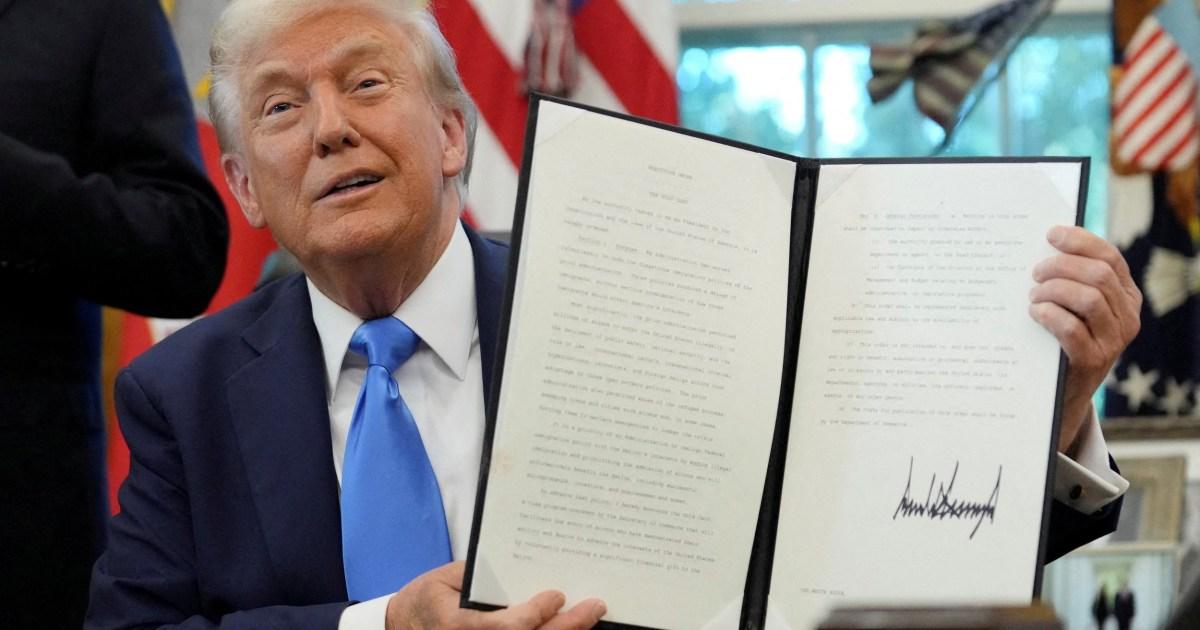Top Stories
Trump Administration Targets Overweight Visa Applicants in New Policy

BREAKING: The Trump administration has just announced a controversial new policy targeting overweight individuals applying for U.S. visas. This significant change is expected to impact thousands of potential immigrants as U.S. consulates receive directives to deny visas based on applicants’ health conditions, particularly obesity.
The new guidelines, released earlier today, outline that visa applicants who are classified as overweight may face rejection if they are unable to cover potential medical costs. Conditions such as obesity, high blood pressure, diabetes, sleep apnea, and other serious health issues have been flagged as reasons for denial. Officials emphasize that these measures aim to protect American taxpayers from the burden of high medical expenses associated with these applicants.
“You must consider an applicant’s health. Certain medical conditions can require hundreds of thousands of dollars’ worth of care,” the guidance states, highlighting the administration’s focus on fiscal responsibility. This directive aligns with Trump’s broader immigration reform strategy, which aims to prioritize the health and financial implications of new arrivals.
Adding to the irony, this announcement coincides with Trump’s unveiling of reduced costs for weight-loss medications, further spotlighting the administration’s dual approach to health and immigration policies.
Spokesman Tommy Pigott underscored the administration’s commitment to prioritizing American interests, stating,
“It’s no secret the Trump administration is putting the interests of the American people first. This includes enforcing policies that ensure our immigration system is not a burden on the American taxpayer.”
According to the National Institutes of Health, annual medical care costs for adults with obesity are approximately $2,500 higher than for those without. This statistic serves as a critical backdrop for the administration’s decision to impose stricter health criteria on visa applicants.
In addition to the crackdown on overweight individuals, the Trump administration previously introduced the Gold Card visa, allowing wealthy foreigners to purchase residency in the U.S. for a staggering $1 million. This program is expected to generate over $100 billion for the U.S. Treasury, aimed at reducing taxes and paying down national debt.
The H1-B visa, widely utilized by skilled workers, is also under scrutiny as the administration continues to tighten regulations. Employers seeking expedited processing for these visas will now face fees of up to $2 million.
Furthermore, a new Platinum Card will grant holders the ability to stay in the U.S. for up to 270 days without paying taxes on non-U.S. income, available for $5 million. This dual approach of targeting both high-net-worth individuals and health-conscious immigration policies is set to redefine the landscape of U.S. immigration.
As the situation develops, potential applicants and immigration advocates are closely monitoring these changes, recognizing the far-reaching consequences for many aspiring to live and work in the United States. The urgency and implications of these policies are sure to spark significant debate in the coming days.
Stay tuned for further updates as this story unfolds, and follow our news page for the latest developments.
-

 Top Stories3 weeks ago
Top Stories3 weeks agoMarc Buoniconti’s Legacy: 40 Years Later, Lives Transformed
-

 Health3 weeks ago
Health3 weeks agoInnovative Surgery Restores Confidence for Breast Cancer Patients
-

 Sports4 weeks ago
Sports4 weeks agoSteve Kerr Supports Jonathan Kuminga After Ejection in Preseason Game
-

 Top Stories2 weeks ago
Top Stories2 weeks agoBOYNEXTDOOR’s Jaehyun Faces Backlash Amid BTS-TWICE Controversy
-

 Science4 weeks ago
Science4 weeks agoChicago’s Viral ‘Rat Hole’ Likely Created by Squirrel, Study Reveals
-

 Lifestyle4 weeks ago
Lifestyle4 weeks agoKelsea Ballerini Launches ‘Burn the Baggage’ Candle with Ranger Station
-

 Entertainment4 weeks ago
Entertainment4 weeks agoZoe Saldana Advocates for James Cameron’s Avatar Documentary
-

 Business2 weeks ago
Business2 weeks agoForeign Inflows into Japan Stocks Surge to ¥1.34 Trillion
-

 Politics4 weeks ago
Politics4 weeks agoDallin H. Oaks Assumes Leadership of Latter-day Saints Church
-

 Business4 weeks ago
Business4 weeks agoTyler Technologies Set to Reveal Q3 2025 Earnings on October 22
-

 Lifestyle4 weeks ago
Lifestyle4 weeks agoDua Lipa Celebrates Passing GCSE Spanish During World Tour
-

 Health4 weeks ago
Health4 weeks agoCommunity Unites for Seventh Annual Mental Health Awareness Walk









